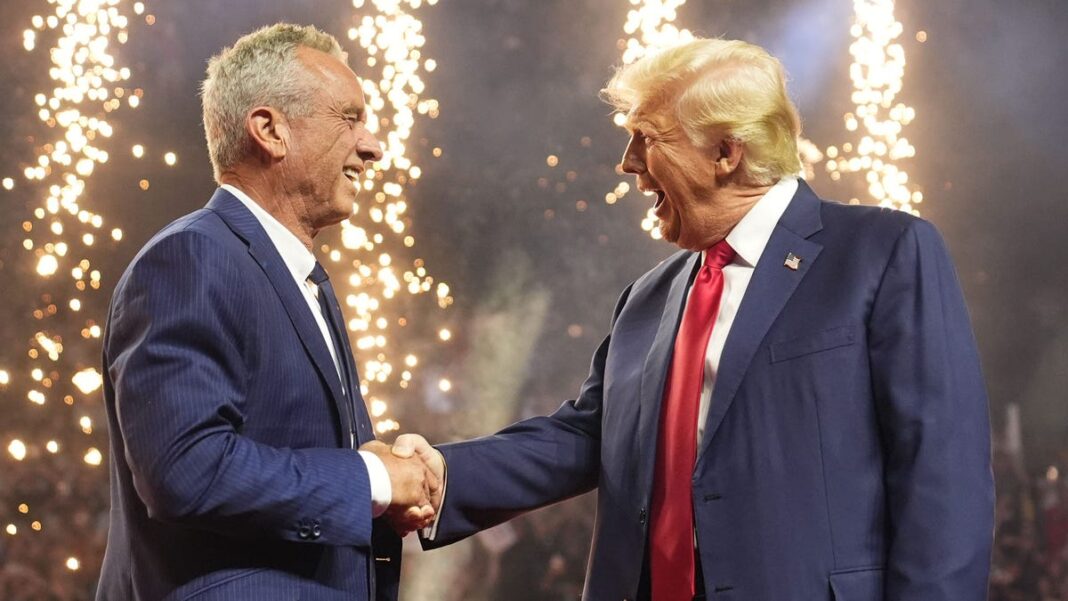Wisconsin Supreme Court rules to keep Robert F. Kennedy Jr. on presidential ballot
MADISON, Wisconsin – Independent presidential candidate Robert F. Kennedy, Jr. will remain on the ballot for Wisconsin voters after a decision from the state Supreme Court on Friday, which addressed his request to have his name removed.
The court noted that Kennedy’s arguments were “insufficient.”
The justices clarified, “We are not making any legal judgments about the claims made by Kennedy nor are we endorsing the circuit court’s legal conclusions on those claims. Our ruling is strictly based on the inadequate arguments presented to us.”
On September 20, the liberal-majority court agreed to an emergency request from the Wisconsin Elections Commission to address the case directly, skipping the appeals court. Despite some dissenting opinions, they chose not to hold oral arguments and allowed Kennedy’s legal team until noon on September 21 to submit a brief, limited to 20 pages.
Chief Justice Annette Kingsland Ziegler and Justice Rebecca Grassl Bradley were opposed to taking up the case. Both justices are known for their conservative views.
Justice Bradley stated, “Procedural fairness is vital. The majority sometimes applies a rule against ‘premature petitions’, yet at other times it does not, without providing clear standards. This inconsistency undermines the principle of judicial process.” She further added that “the majority’s arbitrary approach creates a perception among litigants that judicial processes may be selectively applied based on the desired outcome in politically sensitive cases.”
Kennedy initiated legal action against the Wisconsin Elections Commission earlier this month in Dane County, claiming that independent candidates face unjust treatment due to differing deadlines for ballot access compared to party-affiliated candidates.
His request to have his name removed from Wisconsin’s ballot coincided with his appeal to the U.S. Supreme Court to be included on the presidential ballot in New York.
Candidates aligned with political parties had until 5 PM on September 3 to certify their candidacy, while independent candidates had a deadline of 5 PM on August 6. Kennedy announced the end of his campaign on August 23. Meanwhile, election clerks recently faced deadlines to send out absentee ballots, which included hundreds of thousands with Kennedy’s name.
Kennedy’s legal suit emerged shortly after the state’s election board rejected a request from his campaign to withdraw his name from the ballot, following his endorsement of former President Donald Trump after exiting the race.
Kennedy’s attorneys, along with several Republican members of the elections commission, contended that he should be allowed to withdraw his name before the ballot was finalized. However, Wisconsin law dictates that anyone who files for nomination and qualifies for the ballot cannot withdraw, with the exception being death.
“As per the law, the only way he can avoid being on the ballot is to pass away, which I don’t think he plans to do,” remarked WEC chair Ann Jacobs, a Democrat. “The statute is quite explicit.”
Representatives for the elections commission argued that Kennedy’s name was rightfully kept on the ballot.
“Kennedy submitted nomination paperwork and affirmed his candidacy for the presidency. While his preference now leans toward supporting a major party candidate in Wisconsin, state law prevents the removal of his name from the ballot,” state attorneys asserted.
Concerns have been raised by Republicans about Kennedy’s name appearing on ballots in crucial states, fearing it may divert votes from Trump.
Lawyers representing Kennedy focused their case on the variance in deadlines for candidates who affiliate with a party versus those running as independents to submit their candidacy declarations. They pointed out that President Joe Biden withdrew from the race on July 21, which was before the state’s September 3 cut-off date for party-affiliated candidates in Wisconsin.
The Wisconsin Supreme Court ruled that Kennedy did not successfully establish his argument and did not prove that the earlier circuit court’s decision was incorrect.
The ruling stated, “Although Kennedy’s appeal papers briefly mention his constitutional claims (such as equal protection, free speech, and freedom of association), these arguments are not elaborated upon to a level that allows us to assess their validity.”
According to a poll by Marquette University Law School, more Republicans in Wisconsin supported Kennedy compared to Democrats.
If no changes occur, November’s ballot in Wisconsin will feature eight presidential candidates, including Green Party’s Jill Stein and independent Cornel West.
The justices Ziegler and Bradley agreed with the ruling but expressed their concerns about the situation.
“This case has far-reaching implications,” they noted. “Voters might end up voting for a person who has withdrawn from the race, which undermines their ability to cast a meaningful vote. A ballot indicating a non-candidate could mislead voters and distort the results of a presidential election. The consequences on voter participation and the integrity of our democracy are very real.”
(This story has been updated with additional information.)

